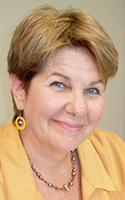By Jennifer Faringer

Substance use disorder (SUD) is a chronic brain disease from which people can and do recover every day. Yet too often, the terminology used to describe SUDs further stigmatizes individuals with a substance use disorder (as well as their family members). Use of words such as addict, alcoholic, drug habit, clean or dirty, all tend to suggest that the problematic use of substances is essentially a moral failing.
These terms imply that choice or lack of willpower or character determine one’s use of substances when the disease of addiction is far more complex than that. The terms do not take into consideration current research that shows that addictive substances and behaviors (alcohol, tobacco, other drugs and problem gambling) and their repeated use alters an individual’s brain chemistry and the functioning of their brain circuitry, often resulting in a diagnosable disorder.
The term abuse, in and of itself, is more closely associated with a punitive response and with negative attitudes which are more likely to result in diminished quality of care and treatment outcomes. The American Medical Association and the American Society of Addiction Medicine have recommended adopting language that is less stigmatizing.
Person-first language is being adopted across multiple disciplines for better describing individuals with a range of disabilities or medical conditions, including substance abuse.
Some examples include:
• Using the term “person with a substance use disorder” or “person with an alcohol use disorder” rather than the terms abuser, addict or alcoholic.
• Using the term “person in long-term or sustained recovery” rather than referring to the person as “clean.” The person in recovery (and there are multiple paths to recovery) exemplifies one who has engaged in a lifelong process of healthy growth and positive change.
• Medication-assisted treatment and medication supported recovery refer to the therapeutic use of any medication that is approved to treat substance use disorders in combination with counseling or psychosocial support. Using terms such as “replacement” or “substitution” therapies imply that the person in recovery is simply substituting one drug for another.
Help transform the conversation from the use of stigmatizing language to one of health, hope and recovery!
For further information and resources, visit the NCADD-RA’s website at www.ncadd-ra.org or the Facebook page at http://www.facebook.com/NCADDRA.
